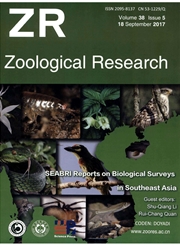

 中文摘要:
中文摘要:
2003-2005年,利用红外线摄像仪,对人工饲养条件下扬子鳄(Alligator sinensis)的营巢和产卵行为进行了研究。扬子鳄在产卵前,有营造后肢落脚洞的行为;在产卵后期,一边产卵,一边覆盖。为探讨气候对营巢的影响,采用线性回归对气候和扬子鳄营巢开始时间进行分析后的结果表明,对营巢开始时间影响最大的是4月的平均气温,较高的平均气温会导致扬子鳄营巢开始时间提前。运用主成分分析饲养条件下巢址的环境因子,得出巢址的植被盖度、离水源距离等对扬子鳄的巢址利用有较大影响。
 英文摘要:
英文摘要:
Nest-making and egg-laying behaviors of the Chinese alligator (Alligator sinensis ) under captive-breeding conditions were studied during a 3-year period field work from 2003 to 2005 using the infrared video camera. And for the first time, a behavior of digging a hole for the hind legs before the eggs were laid was observed. The eggs were not covered all at once, but were covered as the eggs were laid towards the late part of the egg-laying period. To understand the connection between climate and nest-making time, an analysis was conducted based on the theory of linear regression, which showed that the mean temperature of April had the strongest effect upon nest-making time: the higher the mean temperature of April, the earlier the nest-making time started. Principal Components Analysis was also conducted to ascertain the effect of surrounding environment factors upon the choice of nesting sites, which indicated that the level of vegetation canopy and the distance to the water sources were among the principal components.
 同期刊论文项目
同期刊论文项目
 同项目期刊论文
同项目期刊论文
 Regression Analysis between Body and Head Measurements of Chinese Alligators (Alligator sinensis) in
Regression Analysis between Body and Head Measurements of Chinese Alligators (Alligator sinensis) in 期刊信息
期刊信息
